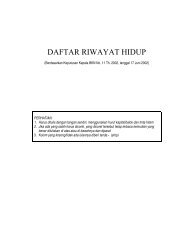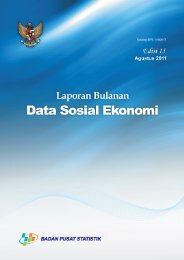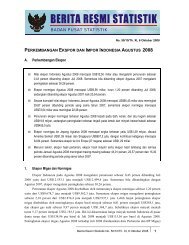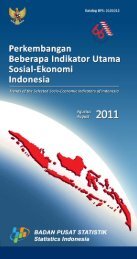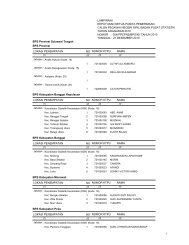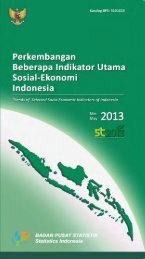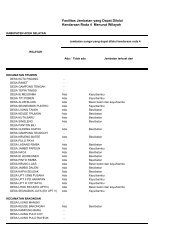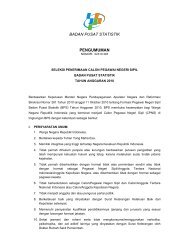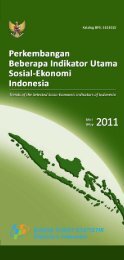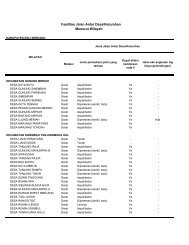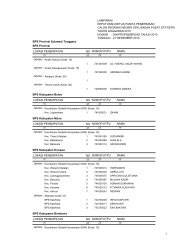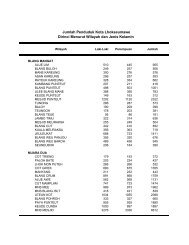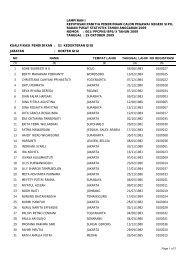Trends of Selected Socio-Economic Indicators of Indonesia, August ...
Trends of Selected Socio-Economic Indicators of Indonesia, August ...
Trends of Selected Socio-Economic Indicators of Indonesia, August ...
Create successful ePaper yourself
Turn your PDF publications into a flip-book with our unique Google optimized e-Paper software.
• Household is a group <strong>of</strong> person who usually live together in a building or housing unit<br />
who make common provision for food and other essentials <strong>of</strong> living. One household<br />
could consist <strong>of</strong> only one household member. Common provision for food means one<br />
organizing daily needs for all <strong>of</strong> household members.<br />
• Household Member is a person who usually lives in a household regardless <strong>of</strong> their<br />
location at the time <strong>of</strong> enumeration.<br />
• Labor force or economically active is population aged 15 years and over who were<br />
working, or have a job but were temporarily absent from work, and those who were<br />
looking for work.<br />
• The concept <strong>of</strong> working means activity intended to earn income by doing work or<br />
helping to do work at least one hour continuously during the reference week (including<br />
unpaid family worker/s for any economic activity).<br />
• Labor force participation rate is labor force as a percentage <strong>of</strong> the working age<br />
population.<br />
• Open unemployment rate is unemployment as a percentage <strong>of</strong> labor force.<br />
• Worker who has Less than normal working hours (it’s called underemployment) is<br />
a person who worked under the normal working hours (less than 35 hours a week).<br />
• Underemployment is a person who worked under the normal working hours (less<br />
than 35 hours a week), and is still looking for a job or available for work (it’s called<br />
involuntary underemployment).<br />
• Part-time worker is a person who worked under the normal working hours (less than<br />
35 hours a week), but he is not looking for a job or unavailable for work (it’s called<br />
voluntary underemployment).<br />
• Wage/Salary is the income earned by labour covering not only all kinds <strong>of</strong>renumeration<br />
received regularly in monetary terms but also additional cash and other incentives<br />
(such as for transportation, lunch, and other incentives in cash) excluding regular<br />
bonuses, such as incentives for major religious festival days “Lebaran”, and other<br />
incentives at the end <strong>of</strong> the year, quarterly incentives and other incentives in the form<br />
<strong>of</strong> nature.<br />
• Literacy Rate is proportion <strong>of</strong> population aged 15 years and over who are able to read<br />
and write in Roman alphabetical or others.<br />
• School Enrollment is the ratio between the total population <strong>of</strong> school age group<br />
(7-12 year; 13-15 year; 16-18 year) who attending school with population <strong>of</strong> school<br />
age group (7-12 year; 13-15 year; 16-18 year). Attending school is someone who is<br />
currently attending primary, secondary or tertiary education package A, package B<br />
or package C.<br />
• Life Expectancy is average number <strong>of</strong> years that a member <strong>of</strong> a “cohort” <strong>of</strong> births<br />
would be expected to live if the cohort were subject to the mortality conditions<br />
expressed by a particular set <strong>of</strong> “age-specific mortality rates”.<br />
• Human Development Index (HDI) is a composite index <strong>of</strong> four indicators: life<br />
expectancy rate, literacy rate, average length <strong>of</strong> school participation, and per capita<br />
expenditures.<br />
• Gini Index is the measure <strong>of</strong> income distribution calculated based on incomeclasses.<br />
Gini ratio lies between null (zero), expresses ‘perfect equality’ and one (1), which<br />
expresses ‘perfect inequality’.<br />
• Poverty line is the value <strong>of</strong> per capita expenditure per month to provide basic food and<br />
non-food needs, needed by a person to stay in a proper living condition.<br />
• Poor people is a person whose expenditure per capita per month is below the poverty<br />
line.<br />
• Harvested area is area which vegetable, fruit, medicinal, and ornamental plant <strong>of</strong><br />
crop harvested during the period <strong>of</strong> report.<br />
• Production is the standard production quantity form <strong>of</strong> vegetable, fruit, medicinal and<br />
ornamental plant based on harvested area reported month/quarterly.<br />
xxii<br />
<strong>Trends</strong> <strong>of</strong> <strong>Selected</strong> <strong>Socio</strong>-<strong>Economic</strong> <strong>Indicators</strong> <strong>of</strong> <strong>Indonesia</strong>, <strong>August</strong> 2012



